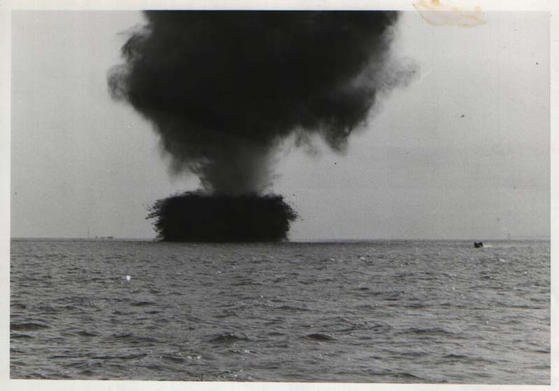DIVING PHOTOGRAPHS NAVY DAYS
Steve "Taff" Livingstone and Gary "Geoff" Hurst Getting ready for an attack swim.


My first Ship, County class guided missile destroyer HMS Glamorgan
During the Falklands campaign many Royal Navy ships were lost to Exocet missiles. HMS Glamorgan was the only British warship to be hit by an exocet missile and survive.

HMS Vernon home of the Diving Gods, cap tally

Most ordnance seems to be found by the Fishermen around the South East coast. If they found anything suspect, they would lower it back to the seabed, after marking it with a line and bouy, they would then alert the authorities who would in turn alert the Bomb disposal team. The Fisherman were very profficient and would often give good descriptions and more often than not they would give good identifications on various pieces of explosive ordnance. Here we are being taken out to a WW2 bouyant British mine.
Left Colin Nutty Carr, centre Nick Kincart (always laughing and smiling) and Team Boss Lt Dave Ellis

Torpedo dragged up by fishing trawler off portsmouth, this one turned out to be an old dummy practice torpedo. Seen here lying in HMS Ver.non

Leading diver Nick Kincart, circa 1980, doing his favourite little trick, with leather washers that were used in the Oxygen booster pumps, all our mixed gas and oxygen divng bottles were pumped up by hand.

Exercise to deal with a suspect parcel.

One of the many roles of the Clearance diving teams is to deal with Improvised explosive devices (IED), terrorist devices sometimes very crude but effective. The role of the IED operator is to deal with these devices, ideally remotely. This photo is of the full IED protection clothing and a remote vehicle, affectionately known as the wheelbarrow.

WW2 Bouyant mine dragged up by a fishing trawler off Folkestone. This one has an explosive charge attatched to the main explosive charge of the mine. This was then lowered to the seabed and detonated. Even now these mines and many other remnants from both wars are being trawled up on a regular basis, especially around the South East coast.

Leading Divers (CD2)Course Photo
Leading Divers (CD2) Course Photo in Summer 1979 photo taken in HMS Vernon. Left to Right top row. LS(D) M.O'Leary, LS(D)Bob Sullivan, LS(D)Paul Leader, LS(D) Bert Steadman, CPO(D)Bill Baukham (course instructor) bottom row LS(D) Ray 'Spider' Webb,LS(D)Tony Groom, LS(D)Ian Lindsay.

The four Hombres
1980 Every other week we would go out on the road, covering the South East coast, dealing with all manner of unexploded ordnance, this was a quiet day prior to a dinner time session. We were a very close knit unit and still friends today.
From Left to right, Paul 'MAC' McNally, Colin 'NUTTY' Carr, Mo Crang, and Me

Blowing up an old german mine in West Mersea, You can just see us to the right in a rubber boat.

Myself and my buddy Colin 'Nutty' Carr surfacing near the beach in Falmouth, We got a lot of attention from the people on the beach that day.

Being lowered over Beachy head to recover suicide victim.

Searching for a body in a lake near Stafford, the two divers are from left Smudge Smith and Tug Wilson

Digging up a bomb found on Margate beach

HMS KIRKLISTON LEAVING PORTSMOUTH

My great friend and mentor, Mo Crang, this must be one of the best photos of a Milsub being worn, Long before they were famous
I first met Mo in 1978 when i joined HMS Kirkliston. Mo was the coxswain and my boss. We then met again in 1980 when we worked together on the Portsmouth and medway Clearance diving team. Mo was a Chief Petty Officer Diver.Our role was bomb and mine disposal for the South east as well as warship maintenance. Although we both left the Navy many years ago we are still the best of friends now, some bonds can never be broken.

Me with a good size eating crab caught off Falmouth.

Me as standby diver during diving operations

A very rare underwater shot of me wearing Clearance divers breathing apparatus, during a nato exercise

DEALING WITH A TORPEDO IN PORTSMOUTH, THIS ONE WAS DRAGGED UP BY A FISHING TRAWLER
Accompanied by a nervous looking Policeman, fisherman on the derrick. Colin Nutty Carr, MoCrang centre, Myself in the Old neck entry rubber suit.

Mo Crang and myself getting ready for an exercise attack swim on HMS Bulwark in Portland, we planted 2 limpet mines in order to test the ships response to sabotage attempts.

ME LEAVING SURFACE TO INSPECT AND IDENTIFY A SUSPECT MINE

Ariel veiw of HMS Vernon, before the developers came in.The building to the extreme lower right is the Portsmouth and Medway bomb disposal H.Q. where i worked.

Vernon creek, Minehunting squadron.

History of the Royal Navy diving branch
For more History on the Royal Navy divng branch, I have put links to some articles written by Rob Hoole. Rob was a Mine warfare Clearance Diving officer. Rob's articles include,the History of HMS Vernon,The history of the Royal Navy Clearance diving branch, HMS Reclaim and her World record and pioneering deep dives. Well worth reading.

Click here to go to the history of HMS Vernon


Click here to go to history of The Royal Navy Clearance Diving Branch

Click here to go to HMS Reclaim
|